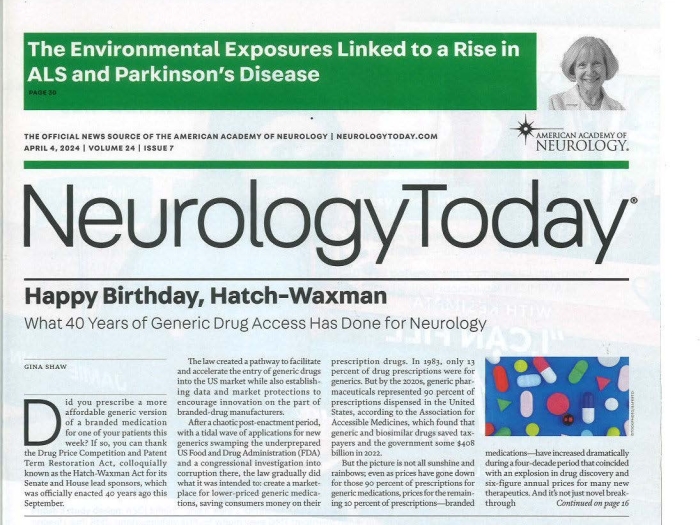Everyone experiences moments of forgetfulness. Where did I put my keys? Who was that actor in that movie? But when does forgetfulness become a medical concern?
It has to do with the severity of the memory issues. Concerns arise when memory issues are “significant, daily and involve large episodes,” explains Henry Paulson, M.D., Ph.D., Lucile Groff Professor of Neurology at University of Michigan Medical School and director of the Michigan Alzheimer’s Disease Center.
“If I can’t remember that I had dinner three nights ago with six people, that’s a concern.”
Dementia vs. Alzheimer’s
Dementia is an umbrella term for when someone has impairment in cognitive domains that is significant enough to disrupt their normal activities.
Alzheimer’s disease is a specific type of dementia that causes a slow decline in memory, thinking and reasoning skills.
“Over 6 million adults in the United States currently have Alzheimer’s and even more have other forms of dementia,” said Scott Roberts, Ph.D., professor at the University of Michigan School of Public Health. Roberts helps lead public education and outreach efforts at the Michigan Alzheimer's Disease Center.
“As our population ages, those numbers are projected to grow over time unless we do more on the prevention front, which makes this a very important public health issue.”
Risk factors that cannot be changed
Age, biological sex and genetics are Alzheimer’s risk factors beyond our control.
Adults over 65 and women are at higher risk for developing Alzheimer’s disease. For these high risk individuals, the 10 early signs and symptoms of Alzheimer’s provide a good foundation for a conversation to have with your healthcare provider, said Lenette Jones, Ph.D., R.N., the Nancy S. and Michael B. McLelland Professor of Nursing and assistant professor at the University of Michigan School of Nursing.
“If you have any questions or memory concerns, that’s a good starting point,” Jones said.
Certain genetic predispositions place individuals at higher risk of developing Alzheimer’s disease.
“We all have the APOE gene, but one in four of us have a variant called APOE4 that increases the chances of developing Alzheimer’s,” Roberts said.
“If someone has one or two copies of the APOE4 inherited from their parents, then they are at elevated risk for Alzheimer’s. Genetic factors are relevant, but they aren’t destiny. You can have the APOE4 allele and still never get the disease, and you can get the disease without having that specific genetic variant.”
Modifiable risk factors
High blood pressure, diabetes and social isolation are among the Alzheimer’s risk factors that individuals can take preventative measures to reduce their risk.
U-M experts provide the following advice to reduce your Alzheimer’s risk:
- Control blood sugar, blood pressure and weight with a healthy diet and regular exercise
- Get adequate sleep
- Engage socially
- Stimulate your mind
- Reduce stress
- Limit your alcohol intake
“There’s no one specific way to reduce your Alzheimer’s risk. Being thoughtful about all of these ways to modify risk factors and deciding on something that you can really commit to will help you reduce your Alzheimer’s risk,” Jones said.
When seeing patients, Paulson shares that daily exercise would be a better prescription than any medication to enhance memory. Although it can be difficult to change habits, increasing your heart rate every day makes a “huge difference in brain function,” emphasized Paulson.
“What’s good for the heart is good for the brain,” Roberts added. Exercise and mental stimulation are good for both the heart and brain and even improve mood.
When it comes to mental stimulation, there are no magic brain games recommended to improve brain function. “It really comes down to what a person likes to do,” Paulson said. Mental stimulation can come from talking with friends, doing puzzles, reading, playing cards, and many other activities.
Treatments
Although there is currently no cure for Alzheimer’s, there are medications that can moderately improve memory in the short term, or at least slow decline.
There are two different classes of these medications: cholinesterase inhibitors and memantine.
“They’re not for everyone,” Paulson said. “They’re helpful for some people, but when I provide them to my patients I say, ‘I don’t know if this is going to make a difference, but we can give it a shot and see what you think.’”
New Alzheimer’s treatments are on the horizon. Anti-amyloid therapies, which target the amyloid plaque buildup in the brain that contributes to Alzheimer’s may be modestly helpful in reducing the rate of the progression of the disease, Paulson says.
Paulson has high hopes for the improvement of disease modifying therapies. “I’m hoping this is the first of many that will come in the next 20 years, and that they’ll be better than what we have right now.”
Research
Researchers are actively conducting studies to learn more about Alzheimer’s and other forms of dementia.
The Michigan Alzheimer’s Disease Center is a statewide Alzheimer’s research partnership between the University of Michigan, Michigan State University and Wayne State University.
The research group is conducting several dozen studies focused on improving Alzheimer’s prevention, diagnosis and care, including:
- Following people over time to search for biological indicators to make more precise diagnoses
- Exploring how sleep affects Alzheimer’s
- Assessing how people respond when they receive results of an Alzheimer’s disease diagnosis
- Studying electrical stimulation of the brain for Alzheimer’s therapy
- Conducting clinical trials for new medications
In the past, most research in the field was conducted on white men.
“Communities of color who have suffered injustices in the name of research like the Tuskegee Experiment and have concerns about participating in research, which means we have less data to guide recommendations and interventions for these particular populations,” Jones said.
Jones encourages women and people of color to participate in research.
“You can be an aware and purposeful research participant,” she said. “You can actively participate and really be confident in the study that you’re participating in and know that the results are going to help others. It’s really important that we learn more about other communities, so if there are differences, we can make those specific recommendations for communities that are at risk.”
Resources:
Support for caregivers of loved ones with Alzheimer’s disease
Michigan Alzheimer’s Disease Center’s Wellness Initiative
Participate in research at the Michigan Alzheimer’s Disease Center

Explore a variety of health care news & stories by visiting the Health Lab home page for more articles.

Department of Communication at Michigan Medicine
Want top health & research news weekly? Sign up for Health Lab’s newsletters today!





